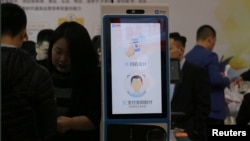Mobile apps and data collection deployed to help contain the coronavirus have a troubling side effect — the potential for long-term government invasions of privacy and surveillance that could be used against independent journalists.
In China, residents currently entering buildings, stores and transit systems must use an app that determines their health status and tracks their location, Reuters and The New York Times reported.
This increased capacity for surveillance and data gathering is concerning, especially in countries that, as Human Rights Watch and other rights groups have found, seek to curtail independent reporting and access to information.
The digital rights group Electronic Frontier Foundation (EFF) said that China’s surveillance systems send information to local police and that citizens had reported being quarantined based on the tracking system identifying their proximity to infected people.
“Such data processing often invades our privacy, deters our free speech and association, and disparately burdens racial minorities,” the EFF report said.
Safeguards questioned
Rights groups and international bodies have questioned whether sufficient safeguards are in place and warned that restrictions could impede journalists’ ability to cover the pandemic and be later used to surveil or harass reporters.
Courtney Radsch, advocacy director of the press freedom group Committee to Protect Journalists (CPJ), told VOA that companies should assess the impact to rights before releasing new technology.
“Once they try it, it is out there,” Radsch said. “Right now they are using these technologies for health care, but without an assessment of how these methods could impact journalists, how do you prevent it being misused?”
International bodies have called for governments to limit the scope and length of time these tools will be used.
The freedom of expression rapporteurs for the U.N., Organization for Security and Co-Operation in Europe (OSCE), and Inter-American Commission on Human Rights said in a joint statement Thursday that governments should take “exceptional efforts to protect the work of journalists” when implementing emergency measures.
“Human health depends not only on readily accessible health care. It also depends on access to accurate information,” the joint statement said.
Using an emergency to censor
The International Press Institute (IPI) this week also warned against using emergency measures as a means to censor journalists or usher in repressive laws.
“This pandemic is seeing some of the most wide-ranging restrictions on individual freedoms in peacetime,” IPI Executive Director Barbara Trionfi said in the statement.
She added that any measures should be “temporary and limited to solving the immediate health crisis.”
As well as increased surveillance capabilities, countries have used false news laws to retaliate against journalists covering the health care crisis and imposed emergency measures that infringe on the right to free expression.
In Honduras, the government imposed a state of emergency that revokes articles of the country’s constitution, including the right to free expression, and South Africa passed a law criminalizing disinformation about the virus or the government’s response to it, CPJ reported.
CPJ’s Radsch told VOA that laws around false news were providing cover for governments to restrict independent reporting. She said CPJ has seen incidents in recent weeks of governments in China, Thailand and Iran retaliating against journalists for their coverage of the virus.
In Egypt, at least 21 journalists were jailed on false news charges at the time of CPJ’s annual prison census in December. Imprisoned journalists are at further risk because of poor conditions in overcrowded prisons.
Authorities in Egypt suspended prison visits for 10 days, cutting off vital food supplies for prisoners whose relatives provide meals.
Egyptian authorities this week arrested a writer, Ahdaf Soueif, and several activists who protested conditions for political prisoners, PEN America, a free speech group, reported.
Karin Deutsch Karlekar, director of Free Expression at Risk Programs at PEN America, said in a statement, “[The arrests] shows the Egyptian government’s reflexive response to the coronavirus pandemic is to silence dissident voices to protect the state’s national image, disregarding both public health and fundamental rights.”
Elsewhere, journalists have questioned whether newsgathering is considered essential work during lockdowns. The U.K. based Press Gazette reported that foreign journalists in Italy were questioning whether they are exempt from the regulations during the lockdown.





